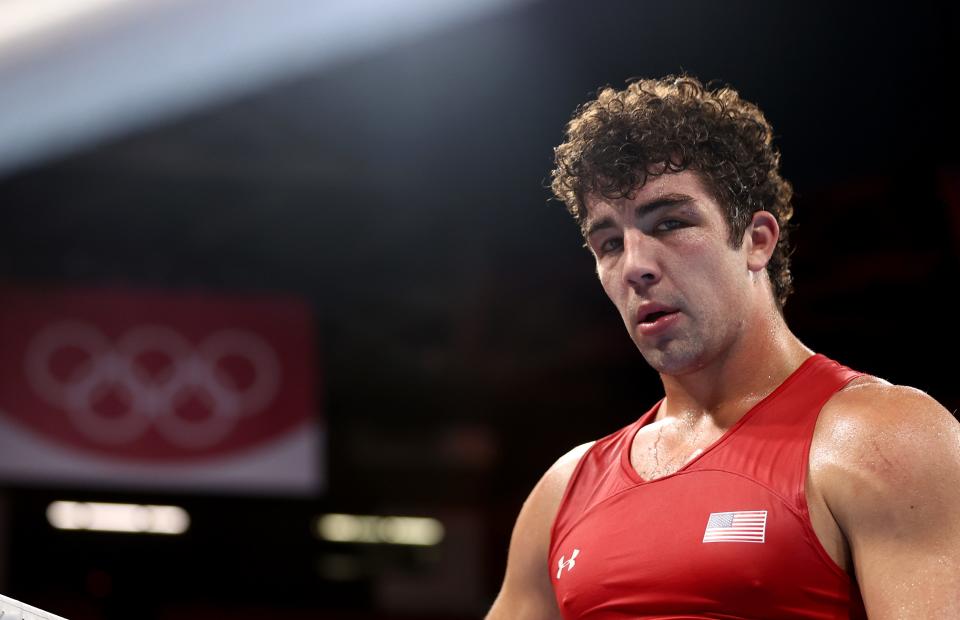Opinion: How Richard Torrez Jr. can end a long American drought in Olympic boxing
TOKYO — By the time Beethoven’s "Moonlight Sonata" started playing over the loudspeakers, which was American Richard Torrez, Jr.’s paradoxical cue that it was time to fight, he had already visualized how his super heavyweight semifinal would play out more times than he could precisely count, from the night before all the way up to the crushing overhand left at the very end of the second round that effectively put him in the gold medal round.
“It’s something my coach said was going to land, my dad said was going to land,” he said. “It’s something I pictured landing. This wasn’t the first time I had this fight.”
When Torrez returns on Sunday, trying to become the first American man to win boxing gold since 2004, he will once again visualize himself executing a game plan to perfection and winning a title that he now believes is his destiny.
The challenge, however, is that will happen against an opponent he’s fought in real life before – and one who made him famous for being on the wrong end of one of the most brutal knockouts you’ll ever see in a boxing ring.
Whatever Torrez remembers of that day at the World Boxing Championships in September of 2019 – which probably isn’t much considering he was unconscious before he even hit the mat – what was clear is that one bad decision against Uzbekistan’s Bakhodir Jalolov that resulted in a punch so damaging that medical personnel rushed into the ring to check his vital signs and ultimately carried him out on a stretcher.

Within boxing, it sparked a controversy. Despite being an amateur event, the 6-foot-7 Jalolov had already fought six times as a professional, something that wouldn’t have been allowed until a rule change in 2016. To that point in his amateur career, Torrez had never been knocked out. But when Jalolov delivered the left hand that knocked him cold, it was characterized even by many within the sport as an unfair matchup. Mauricio Sulaiman, the president of the World Boxing Council, went so far as to tweet that it was “Brutal and criminal.”
When they meet on Sunday, Torrez will face some of the same disadvantages. The 22-year-old from Tulare, California, still isn’t as big as Jalolov. He’s not as experienced, he’s not as decorated with world championship medals and he’s not as highly ranked.
What he is right now, though, is confident that he’s being guided by forces bigger than himself – and if Wednesday’s semifinal serves as any omen – in perhaps the best form of his life. How sharp is Torrez right now?
Moments after he beat Kazakhstan’s Kamshybek Kunkabayev to a pulp, knocking him down twice and gashing him on the bridge of his nose to the point that the fight had to be stopped, a journalist from that country asked him about pundits who picked Torrez to lose. Immediately, without breaking stride, he stuck out his chest and shot back: “Well, they should have asked me.”
But for Torrez, this is not typical boxer’s bravado. He’s not hyping himself or selling pay-per-view subscriptions. He’s well aware of the tiny margins that determine Olympic boxing’s three-round sprint. He just happens to believe that it’s his time.
“There’s something here about it that I feel like I’m supposed to be here,” he said. “I just have this existential feeling that it’s destiny. There’s nothing else to it. I don’t know how to put it, I don’t know how to say it. What is love? It’s kind of that same thing. I’m meant to be here, all I know is that.”
He also knows what he’ll have to overcome to do it.
Though Torrez is not big for a super heavyweight, he has been known as an all-out puncher who can win fights on his power alone. But given how well-rounded he is outside the ring – he’s an amateur magician, a classical music fan, a chess player and an honors student – it’s no surprise that he had to learn how to vary his pace and mix it up with a little defense to beat the best in the world.
“The super heavyweight division really could go either way real quick,” he said. “It’s all up to one punch. This fight kind of shows I can box, I can brawl, I can do multiple things and I was thankful I was able to showcase my abilities.”
After admitting that he was anxious about his first fight here and too aggressive in the quarterfinals against Cuba’s Danier Pero in a fight he won on points, he has settled into a more comfortable routine in Tokyo. That includes prayers even though he’s not religious, the repeated visualization of how he’s going to beat his opponents and FaceTime strategy sessions with his father, who fought at the U.S. trials in 1984 alongside some of the all-time greats.
“Everything has helped me come to this point, and it’s a recipe for greatness,” Torrez said.
If he can follow it one more time, it may very well be a recipe for a gold medal.
This article originally appeared on USA TODAY: Richard Torrez Jr. can end Olympic drought for American male fighters

